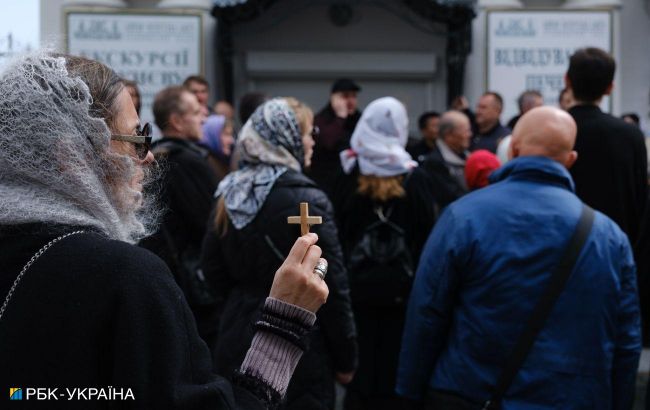Russian Orthodox Church banned: Details of Ukraine's religious organizations bill
 The Committee of the Parliament supported the bill on banning religious organizations associated with the aggressor country (Vitalii Nosach, RBC-Ukraine)
The Committee of the Parliament supported the bill on banning religious organizations associated with the aggressor country (Vitalii Nosach, RBC-Ukraine)
The Committee of the Ukrainian Parliament on Humanitarian and Information Policy has completed the consideration of amendments and recommended the Parliament adopt bill No. 8371 on banning religious organizations associated with Russia in the second reading.
Explaining the significance of the bill, when to expect its consideration by the Parliament in the second reading, and why the document cannot be interpreted as merely "restriction of the UOC-MP (Ukrainian Orthodox Church of the Moscow Patriarchate) activities," clarifies the Chairman of the Committee on Humanitarian and Information Policy, Mykyta Poturayev, in a comment to RBC-Ukraine.
A total of 1237 amendments were submitted, of which over a thousand were rejected. In the first reading, there were 267 votes for it, which is quite normal. As for the second reading, it may be more challenging. This is because the bill has become more effective and stricter.
Now it will be impossible to criticize, as before the first reading, that it was toothless and inefficient, that its implementation would take a lot of time, and that it could be challenged indefinitely. All of this has been rectified, replaced with more effective norms, while remaining within the corridor of European standards and freedom of conscience, as well as other human rights in this area, and within the framework of European procedures for considering such conflict situations.
On the timing of consideration in the second reading
There are difficulties with political consensus within the Ukrainian Parliament itself. I hope that these difficulties will be overcome because not only this law, but also the issue of mobilization is on the table, which is truly important for national security laws. I hope that for this purpose, the Parliament will find a compromise and consensus within itself, and if this happens, then I think the end of March, or the beginning of April is quite realistic to consider the bill.
Main goal of the bill
It is worth noting that it is categorically incorrect to speak about the main goal of the bill being the restriction of the UOC-MP's activities. This was not its initial goal, and it is not its goal now. On the contrary, it should be understood that it is now very important for us to have a clear narrative through all possible Western channels, our Western partners, and allies that we did not adopt a law regarding one specific church or religious organization. We adopted a law that ultimately allows us, in the third year of full-scale invasion and the eleventh year of war, to effectively counter enemy propaganda spread through religious organizations.
Yes, undoubtedly, we understand that the UOC (which has already been confirmed even by numerous court rulings) was the main channel, but this does not mean that we should forget about other possible channels for spreading hostile propaganda against our country through religious organizations.
The religious organization of Ukraine has no right to be affiliated and to be in hierarchical relationships of subordination with those religious organizations that have governing centers in the aggressor state. This is what this bill is about. About the unconditional prohibition of serving as a channel and mouthpiece for enemy propaganda. We need to emphasize this because UOC lobbyists, understanding the goals it served and still serves, are spreading misinformation about this law in the West, claiming that the law is aimed specifically against a particular church. No, no, and again no.
Important nuance
Yes, the bill contains a political condemnation of the Russian Orthodox Church (ROC). Moreover, it not only contains a political condemnation but also includes a declaration that Ukraine prohibits the ROC. But this does not mean that the Ukrainian Orthodox Church (UOC) is automatically banned because the UOC claims that it is not the ROC. Although the so-called Patriarch Kirill says otherwise, as is known. And as soon as the occupation army enters some of our territories, for some reason, the UOC automatically becomes the ROC in these territories. It's strange, isn't it?
But they claim to be separate from the ROC, that they have severed all ties. Okay, this is a great opportunity to prove it. Moreover, since I referred to European legal procedures, which are embedded there, they can do it out of court. Quite calmly. It is not necessary to wait for the State Service for Ethnopolitics and Freedom of Conscience to go to court. They can do it themselves perfectly well.
The question is whether they want to do it. Because they have spent hundreds of thousands of dollars, in my estimation, already on lobbyists and lobbying disinformation campaigns against this law. So somehow I have the feeling that they don't want, not just in words but in deeds, to prove that they have no connection with the ROC anymore.
Mykyta Poturayev for RBC-Ukraine

